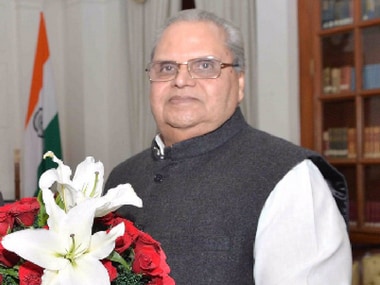If the appointment of a politician as the governor of Jammu and Kashmir was meant to set the state’s political circles buzzing, it has succeeded. Ironically, both the established parties in the Valley appear to feel encouraged. Top leaders of both parties have known Governor Satya Pal Malik from the time they have spent as members of Parliament, and have a good equation with him. The fact that it was Narendra Modi’s decision to send Malik would seem to indicate that the prime minister is keen to build bridges of trust with the major Valley parties. Senior leaders of the PDP indicate that it was former chief minister and party founder, the late Mufti Mohammed Sayeed, who had first suggested that Malik be appointed as the state’s governor. The suggestion was made when the BJP first came to power. It was then presumed that Governor NN Vohra, who had already been in office for six years, would be replaced. The PDP and the BJP were not yet openly in alliance, but Mufti Sayeed and Modi had already established a good rapport. Malik had been minister of state for civil aviation in the VP Singh government in 1990, when Mufti Sayeed was the home minister. One of the first things Malik stated after he was appointed as Governor was that Mufti Sayeed was ‘a friend’ and `a wonderful person.’ [caption id=“attachment_5040071” align=“alignleft” width=“380”]  File image of Jammu and Kashmir Governor Satya Pal Malik. Twitter/@rashtrapatibhvn[/caption] Mufti’s daughter and current PDP leader Mehbooba Mufti also knows Malik and has a good equation with him, according to party insiders. Abdullah’s bonhomie On the other hand, National Conference President Farooq Abdullah too has a good equation with the new governor. Abdullah flaunted this by turning up at the airport to receive Malik. Political circles in the state were abuzz with talk of how Abdullah, who was not part of the protocol line-up to receive the governor, got a warm response from Malik. The latter promptly went up to Abdullah, and left the tarmac with him. However, when reporters later asked Abdullah about the possibility of his party joining hands with the BJP, he strongly signalled that this was not on the cards. In fact, a new state government with either the PDP or the National Conference seems unlikely, and yet, both parties appear to be comfortable about the new Governor. Dissidents uneasy All this bonhomie has made those who had hoped to form an alternative government appear uneasy. These include the PDP MLAs who had publicly expressed their dissent against Mehbooba’s leadership, and leaders of Sajjad Lone’s People’s Conference. Even though it was Eid, these leaders engaged intensively in talks in New Delhi. These MLAs had been very hopeful in July, about a month after Governor’s rule began, that they would be installed in government in early September, soon after the Amarnath Yatra ended. They had been in touch with BJP general secretary Ram Madhav, and got the impression that they would be helped to form a government with the support of BJP MLAs. They are said to have had a meeting with top BJP leaders at a metropolitan location just a few days ago. Their enthusiasm had been high when the PDP MLAs first distanced themselves from Mehbooba Mufti at the start of July, less than a fortnight after the BJP withdrew support to the state government led by her. The dissident group in the PDP is led by Imran Ansari , who was a cabinet minister and has strong support in the state among his Shia community. Several of this ginger group seemed confident that, as the ranks of PDP dissidents expanded, Sajjad Lone would be installed as the new chief minister with the support of the BJP and the PDP. Since early in August, however, members of the dissident group have been uneasy about signals from the secretariat, which indicate that the chief focus is on ensuring efficient, rules-based governance to common people through officials. Further, they see the panchayat and local bodies elections, which the government has announced, as likely to undermine them, and the political class overall.
If the appointment of Satya Pal Malik, a politician as the governor of J&K was meant to set the state’s political circles buzzing, it has succeeded.
David Devadas is an expert on politics and geopolitics. Formerly a Senior Fellow at the Nehru Memorial Museum and Library, Visiting Professor at Jamia Millia Islamia, and Political Editor of Business Standard, he is currently Distinguished Fellow at the Institute for Social Sciences. He has written books on Kashmir, on youth, and on history. He has been a radio compere, guest faculty at JNU's Academic Staff College, St Stephen's College and Hindu College. He has worked for the Indian Express, The Hindustan Times, India Today, The Economic Times and Gulf News. His most impactful article, on a murder cover-up, prevented a Congress President from becoming prime minister. One led to the closure of an airline, and another created a furore and consequent clean-up in Delhi's health department. Several have correctly predicted election results in key states, and a series of reports from Srinagar made the government aware of how unsettled the situation there was in 1990. He is an alumnus of St Xavier's School, St Stephen's College, and the Indian Institute of Mass Communication. He has lived for extended periods in Geneva and Berlin, and has traveled to almost 50 countries. He enjoys various kinds of music, theatre, design, architecture and art. see more


)
)
)
)
)
)
)
)
)



